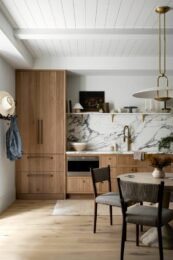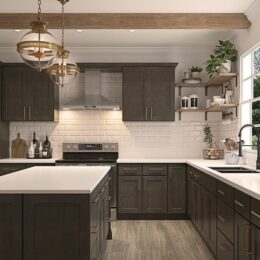Deciding between a kitchenette and a full kitchen depends on how much space you have and what you need. A kitchenette is small and efficient, good for places like apartments or guest rooms where you want to save space but still have what you need to cook. A full kitchen is bigger and gives you more room for cooking and storing things. It’s great if you enjoy cooking a lot or often have people over. This article will help you figure out which one fits best for you based on what you need and how much space you have.
Understanding kitchenettes
A kitchenette is a small, self-contained area designed for basic cooking tasks. It is commonly found in places like studio apartments, dormitories, hotel suites, or office break rooms. Unlike full kitchens, which are larger and more comprehensive, kitchenettes are compact spaces tailored to meet minimal cooking and dining needs.
Features of a kitchenette
Compact size: Kitchenettes are notably smaller than traditional kitchens, often occupying a corner, alcove, or designated area within a larger room. This compact size makes them ideal for environments where space is limited, such as small apartments or hotel rooms.
Basic amenities: Typical features of a kitchenette include essential appliances like a mini-fridge for storing perishables, and a microwave or countertop oven for simple cooking tasks. Some may also include a sink for food preparation and dishwashing, although these amenities vary depending on the specific setup.
Limited appliances: Due to space constraints, kitchenettes usually lack full-sized appliances such as ovens, stovetops, or dishwashers. Instead, they focus on providing the necessary tools for preparing and consuming light meals conveniently.

Source: Pinterest
Benefits of choosing a kitchenettes
- Space saver: Kitchenettes maximise living space by omitting a full kitchen, ideal for studios and tiny homes.
- Budget-friendly: Lower rent and initial costs make kitchenettes economical, especially in high-cost areas.
- Simple living: Encourages minimalism with essential appliances, perfect for those preferring a clutter-free environment.
- Energy efficiency: Smaller appliances mean reduced energy use and lower utility bills.
- Focus on functionality: Everything is conveniently accessible, streamlining meal preparation.
- Perfect for light cooking: Suited for simple meals like reheating and preparing quick dishes.
- Easy maintenance: Compact size makes cleaning quick and straightforward.
- Improved social interaction: Shared kitchenettes can foster casual social connections in communal settings.
Limitations of kitchenettes
- Limited functionality: Designed for basic food preparation, lacking ovens and stovetops for elaborate cooking.
- Cramped quarters: Compact size restricts movement and multitasking, challenging for storing groceries and cookware.
- Appliance limitations: Relies on limited appliances like microwaves, unsuitable for diverse cooking needs.
- Entertaining challenges: Difficult to host gatherings due to limited space for food prep and guest comfort.
- Unpleasant odours: Limited ventilation may allow cooking odours to linger in living areas.
- Not Ideal for sharing: Sharing with roommates can feel cramped, challenging coordination and personal space management.
Understanding kitchens
A full kitchen is a big, well-equipped room where you can cook and do more than just make meals. It’s a place to hang out with friends, and try new recipes.
Features of a full kitchen
Lots of space: Full kitchens have plenty of room for cooking and storing things like pots, pans, and food.
All the appliances: They usually come with a big oven, a stove with many burners, and a hood to take away cooking smells. You might also find a dishwasher, a garbage disposal, and a microwave.
Different areas: These kitchens are set up with spots for different jobs. There’s a place to get food ready, a cooking area with the stove and oven, a sink for washing dishes, and cabinets and shelves for storing things.

Source: Pinterest
Factors to consider in your decision
| Factor | Kitchenette | Full kitchen |
| Space availability | Needs very little space, good for small homes like studios | Needs a lot of space, not good for small places like studios |
| Pros for space | Saves space, uses room well | Plenty of storage and room to move around |
| Cons for space | Can feel tight | Not good for many people in kitchen at once |
| Lifestyle preferences | Good for simple cooking and heating up food | Great for cooking a lot, baking, and trying new foods |
| Pros for lifestyle | Makes it simple to live with less stuff | Can try all kinds of cooking and food |
| Cons for lifestyle | Limits cooking and having people over | May need to plan and shop more for food |
| Budget | Usually has lower rent costs | Might cost more to set up with appliances |
| Pros for budget | Saves on bills because fewer appliances | Can raise the value of the place, especially for selling |
| Cons for budget | Might need more appliances later | Might cost more to keep big appliances working |
FAQs
When is a full kitchen a better choice?
Full kitchens are ideal for frequent cooks, those who love to bake, or people who enjoy hosting dinners and gatherings.
Do I have to give up on cooking with a kitchenette?
No, kitchenettes can handle basic cooking tasks. You can use a microwave or countertop oven for simple meals.
How can I maximise functionality in a kitchenette?
Invest in space-saving appliances, utilise vertical storage with shelves, and keep only essential cookware.
Is a full kitchen a must-have for resale value?
Generally, homes with full kitchens fetch higher prices compared to those with kitchenettes.
Are kitchenettes common in apartments?
Yes, kitchenettes are frequently found in studio apartments and some one-bedroom units.
Can I install a full kitchen where I currently have a kitchenette?
Significant renovations might be required, and it's advisable to consult a professional to assess feasibility.
Is there a middle ground between a kitchenette and a full kitchen?
Some apartments offer galley kitchens, which are compact but have more space and appliances than a kitchenette.
| Got any questions or point of view on our article? We would love to hear from you. Write to our Editor-in-Chief Jhumur Ghosh at jhumur.ghosh1@housing.com |







